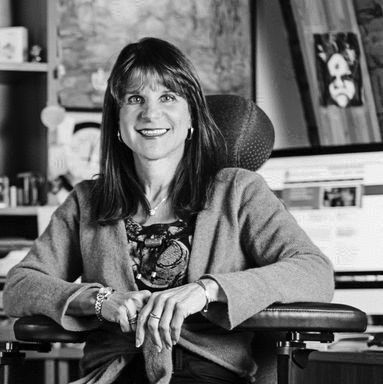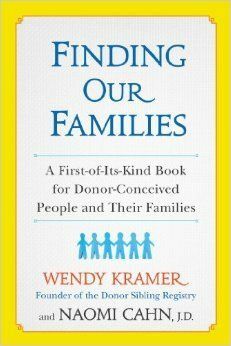Many of us who are considering having a child face the possibility of not being genetically related to that child. Whether you’re a man, woman, or couple dealing with infertility or a genetic abnormality that makes it impossible to have a biological child, or you’re a gay couple, and you choose to use donor eggs or sperm, someone in your family equation will be in the position of being the non-bio parent.
Over the years at the Donor Sibling Registry, we have learned that many non-biological moms and dads have not been adequately counseled or educated before using donor conception to create their families. It is vital that these parents deal with any grief and shame that they may have around their own infertility, work through any emotions they might be experiencing from this lack of biological connection, and educate themselves all about the needs and issues a donor child might have. If this doesn’t happen, there’s a good chance that this parent will pass this discomfort and shame along to the child.
Often the couple or individual will choose anonymous donors as a way to ignore or negate the fact that the donor is a real person. Choosing an anonymous donor will feel less fearful to them because they might think that the chances of their children being curious about, searching for, or finding their biological parent will not be as high.
Many will withhold the truth from their children. And even if they decide to disclose, many will risk passing along their insecurities and fears with regard to their child having any type of curiosity about and wishing to connect with their unknown biological family. Not making peace with your lack of biological connection may create discord within your child, when any natural feelings of curiosity arise within them.
Through my experience running the Donor Sibling Registry, I’ve learned that all these approaches can have very serious ramifications for the donor-conceived child, and in fact for the whole family dynamic. Family secrets are toxic, and these parents, expecting honesty from their children, owe their children the same. In these families, all too often the “secret” hovers just beneath the surface, creating distance between family members who don’t have a clue as to why and where this feeling of distance is coming from.
Sometimes offspring learn or figure out the truth, but they still shoulder the secret. In our research of 751 offspring, we learned that often, adult donor offspring found out that they were donor-conceived but we’re afraid to tell their dads that they knew for fear of hurting them. In this case, families create a double secret, as the children themselves are also struggling to keep the “secret” that the parents have shouldered for so long. These donor-conceived people feel acutely aware that the methodology of their conception causes pain to their parent, and therefore willingly accept the weight of this pain to also carry themselves. This only enforces the idea that the way they were created is somehow shameful. I suspect that in time, this will also be the case for the thousands of children conceived with egg donors, although currently, most are either unaware of their origins or are just too young to be dealing with these types of issues.
These issues come up for both straight couples and LGBT families. I hear all too often that the non-bio mom in an LGBT family, for example, is afraid of a child reaching out to half-siblings and/or their donor, saying, “Biology doesn’t make a family.” Their sadness is about not being able to give their child that genetic connection that they so greatly desire from people outside their nuclear family. All too often this is expressed as disappointment or anger, so that a child feels a great sense of betrayal, even just thinking about the unknown people they are genetically related to. This can be paralyzing to the donor offspring who have a longing or desire to connect with these unknown relatives and actually make efforts to do so.
Surprisingly, there are even some single mothers by choice who also experience fear as they contemplate that their child has genetic relatives out there that are not known. They sometimes want to think that their child is unique, and the thought that there might be 5, 10, 50, or more than 100 others out there born from “their” donor is unsettling. Sometimes these moms even try to buy up all the available vials of sperm, so that no more children can be born from their donor. Even these moms sometimes want to keep their children from connecting with their half-siblings and/or donors.
In the beginning, we as parents make all the choices about how our child will come into the world. These are choices that will affect our children for their entire lives. At some point, it isn’t about us or what makes us most comfortable. We need to be asking, “What is in the best interests of this child to be born?” Reading research and testimonials from donor-conceived people should be required before making any decisions.
And at some point, it will be up to the child to define their own sense of family. What may be just a “donated cell” to the parent often means a lot more to a donor-conceived person. If a child grows up in a family where half of their genetic, ancestral, and medical background is minimized or negated, they can feel a lot of guilt if and when they become curious about this invisible side of themselves. We as parents need to be very careful not to put our own fears and biases onto our children and allow them to process for themselves the meaning of “family” as they mature. This is not about our fears as parents. We brought these children into the world using a methodology that cut them off from one-half of their genetic background. We owe it to them to honor and respect any desires they have to seek out this unknown or “invisible” family.
If connections are made between donor-conceived people and their half-siblings and/or donors, some parents have responded with fear, saying, “Those people are NOT your family!” Although they are not your genetic family as a parent, they are indeed your child’s family. Fearing that, and insisting that it isn’t so, just won’t make the genetic connection invalid. Negating the importance of a genetic connection is absurd. Let’s think about the day that our children were born. As parents, we didn’t just go into the hospital nursery and choose any baby to take home. No, we wanted the baby that was biologically ours. Biology does indeed matter. And although it is not the only way to form a family, it has been throughout the ages the most common way that humans have defined family.
Even if you don’t feel any connection to your child’s newfound relatives, it is your job to be open, warm, and accepting. Having your complete acceptance will allow your child to fully explore and define these new relationships.
Adequate counseling and education and working through one’s own grief and fear as well as understanding our children’s desire to know about their ancestry, medical background, and roots before pregnancy would save a lot of donor families from heartache. Making peace with the concept of not being genetically related to your children is essential to creating an honest, respectful, and healthy family with strong bonds. Exploring what it means to be a parent and asking questions such as “Is it genetics or taking care of, raising, and nurturing a child that makes a parent?” is an important part of the process. Having a deep understanding and respect for the fact that knowing where you come from is an essential ingredient in the formation of your donor-conceived child’s current and future identity is, therefore, a vital step toward having a healthy family.
At the Donor Sibling Registry, we celebrate all of these family connections!


